-
by Admin
17 February 2026 2:34 PM



The executing court dragged the matter for ten years when it should have straightaway decided maintainability under Rule 102 CPC — In a decisive verdict Allahabad High Court in Smt. Santosh Awasthi v. Smt. Urmila Jain [Neutral Citation No. 2025:AHC:35146] set aside an order of the Additional District Judge, Jhansi, which had prematurely dismissed an application under Order XXI Rule 97 of the Code of Civil Procedure. Justice Rohit Ranjan Agarwal held that the revisional court had “assumed the jurisdiction of the executing court,” thereby overstepping its limited revisional powers under Section 115 CPC.
The petitioner, a transferee of the disputed property during pendency of the suit, was held to be a transferee pendente lite, and thus, hit by the doctrine of lis pendens under Section 52 of the Transfer of Property Act. The High Court concluded that her resistance to execution under Rule 97 CPC was legally untenable—but emphasized that it was the executing court’s duty to decide this threshold issue, not the revisional forum’s.
“Transfer During Pendency of Suit Renders the Transferee Bound by the Decree”
Tracing the property dispute back to the 1970s, the Court noted that Plot No. 776 was the bone of contention between Urmila Jain—who had purchased it in 1979—and Ram Narayan, husband of the original purchaser of a different plot (No. 767). When litigation ensued over possession and injunctions in the early 1990s, the suits were clubbed. Urmila Jain’s suit was decreed in 2003, while Ram Narayan’s was dismissed.
During this very pendency, Ram Narayan sold the disputed property to the petitioner Santosh Awasthi in 2001. Justice Agarwal highlighted: “It is an admitted fact that the property was transferred during pendency of the suit… the petitioner is a transferee pendente lite and is hit by the provisions of Section 52 of the Transfer of Property Act.”
The Court cited the Supreme Court’s authoritative judgment in Siddamsetty Infra Projects Pvt. Ltd. v. Katta Sujatha Reddy, holding: “The very purpose of lis pendens is to ensure that the process of Court is not subverted and rendered infructuous… Any transfer that is made during the pendency is subject to the final result of the litigation.”
“Revisional Court Exceeded Jurisdiction by Dismissing the Application Instead of Remanding”
Justice Agarwal faulted the revisional court for dismissing the petitioner’s application under Order XXI Rule 97 outright, instead of remanding the matter for appropriate adjudication by the executing court.
“The revisional court… had assumed the jurisdiction of executing court and dismissed the application filed under Order XXI Rule 97… though observing that the issue of res judicata should have been decided first.”
The Court reiterated that revisional jurisdiction under Section 115 CPC must be exercised sparingly and does not authorize adjudication on disputed facts.
“The revisional court should not have exceeded its jurisdiction and rejected the application… it could at the most have remanded the matter with certain directions.”
“Executing Court Kept Application Pending for a Decade in Clear Misapplication of Law”
The High Court was equally critical of the executing court, which had framed an issue of res judicata in 2014 but postponed its decision until the final stage, keeping the matter in limbo for nearly a decade.
“The executing court had wrongly dragged the matter for almost 10 years… it should have, at the very outset, proceeded to pass the order in pursuance of Rule 102 CPC.”
Referring to Silverline Forum Pvt. Ltd. v. Rajiv Trust, the Court emphasized that where the applicant admits to being a transferee pendente lite, the court is not obligated to entertain questions raised by such person.
“The doctrine of lis pendens prohibits a party from dealing with the property which is the subject-matter of suit… resistance or obstruction by a transferee pendente lite is barred under Rule 102.”
“Courts Must Not Permit Delays in Execution Proceedings—Mandate is Six Months”
Highlighting systemic concerns about delay in execution proceedings, Justice Agarwal drew upon the Supreme Court’s recent directive in Periyammal v. V. Rajamani, reiterating: “The executing court must dispose of the execution proceedings within six months from the date of filing… which may be extended only by recording reasons in writing.”
“The mandatory direction contained in Para 42.12 of Rahul S. Shah v. Jinendra Kumar Gandhi requiring timely execution has been reiterated… and must be strictly followed.”
The High Court, while recognizing the petitioner’s claim as legally barred under the doctrine of lis pendens and Rule 102 CPC, nonetheless held that it was the duty of the executing court—not the revisional court—to decide this issue. Accordingly, the order dated 5th August 2024 passed in Civil Revision No. 59 of 2024 and the executing court’s order dated 16th May 2024 were both quashed.
The matter was remanded back to the executing court with specific directions to decide the pending Rule 97 CPC application in accordance with the law and Supreme Court precedents within one month.
Date of Decision: 11 March 2025
